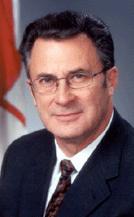Madam Speaker, I would like to comment on the amendments put forward by the hon. member for Gaspé. I am not going to support these amendments.
Coming from the same area as the hon. member, it is perfectly right and legitimate that he raise these amendments to this legislation.
The clerks at the table make a judgment on whether these amendments are legal. That is why we have a law clerk. In fact, I was once a law clerk in a provincial legislature. That is why we have an assistant clerk, a chief clerk. They make those decisions.
I can also understand why the hon. member in some of his amendments talks the way he does about the ecosystem and about the great dissatisfaction he and his fishermen have with the way the federal government has treated the ecosystem over the years.
The great Gaspé area puts out a brochure for June that says: "Fishing from the wharves". That is for saltwater fish. Just imagine, fishing from the wharves. And under that it says: "In various sections of the Gaspé for this year". There is listed which wharves are the best wharves for fishing cod.
We cannot fish cod in Newfoundland and Labrador because of the moratorium. However, the federal government allows fishing from the wharves in the Gaspé for cod, mackerel, sea trout and so on. It is a great fishing area. The best spawning area in the world for mackerel is the Gaspé coast. What has happened over the years?
I can understand the hon. member. Over the years the federal government had given licences to Norway, Sweden and Denmark to fish every year at this time as the mackerel are coming in to spawn in that great spawning area in the gulf. What these vessels did was block the spawning path of the mackerel as it came in in one big line. Believe me, that is not too long ago.
In fact we still have foreign licences inside 200-miles. I am surprised that the opposition has not introduced an amendment to end it for all time.
What happened to the squid that once frequented the Gaspé peninsula and the eastern coast of Canada?
The hon. member talks about the ecosystem, the squid that used to go into the gulf, the squid that were the food of the cod, the flatfish and every other type of groundfish. The squid are born around Florida. They come up the coastline of Canada, go into the gulf, go way up around the east coast of Canada, come back down in one year to Florida and die. They know where to go, do they not? They go down to Florida in that one year cycle, reproduce and then die. Ever since I can recall the federal government has judged squid to be underutilized. Therefore it has granted the licences for the great interception of the squid on their way up around the east coast of Canada into the Gulf of the St. Lawrence and around the Gaspé Peninsula.
I can understand what the hon. member is talking about when he talks about the federal government's mismanaging the resource historically. Historically there is certainly a case to be made for the federal government's total and utter mismanagement of the fisheries. There is no doubt about it. However, in the meantime I will not support the hon. member's amendment. I do not want him to get excited.
The unfortunate part of the management of the fishery that sometimes fisheries and oceans does not understand is the fact that fish swim. Fish actually swim.

